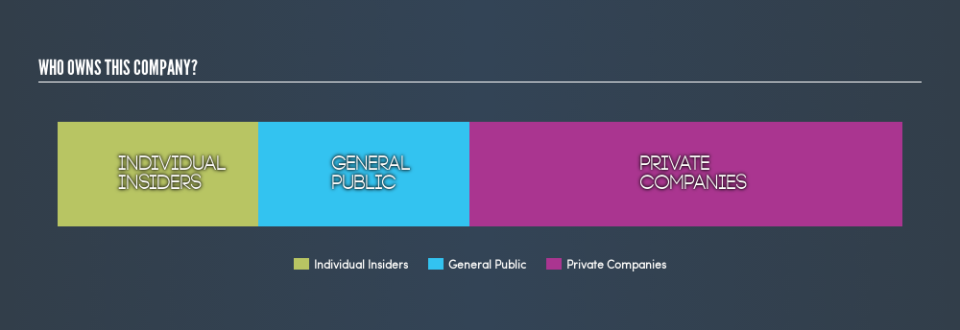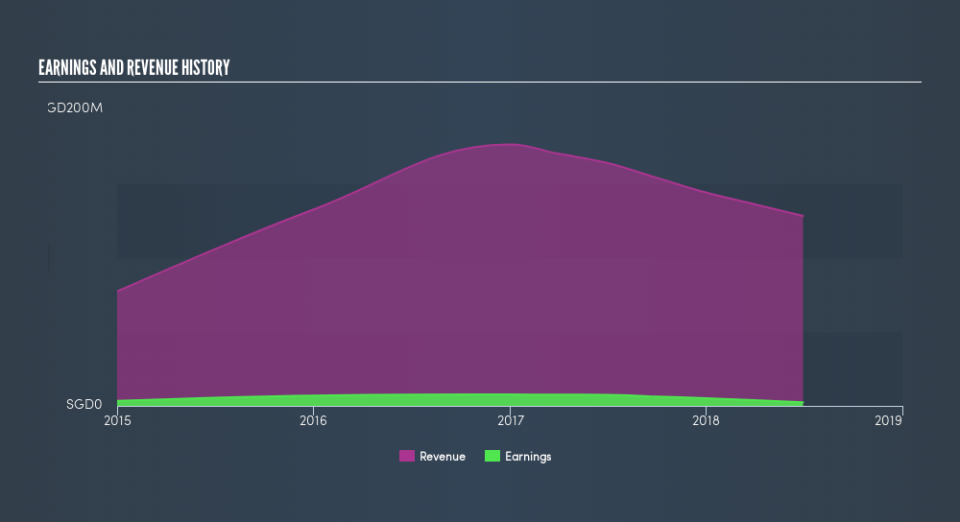What Type Of Shareholder Owns BHCC Holding Limited’s (HKG:1552)?

Want to participate in a short research study? Help shape the future of investing tools and receive a $20 prize!
Every investor in BHCC Holding Limited (HKG:1552) should be aware of the most powerful shareholder groups. Large companies usually have institutions as shareholders, and we usually see insiders owning shares in smaller companies. Warren Buffett said that he likes ‘a business with enduring competitive advantages that is run by able and owner-oriented people’. So it’s nice to see some insider ownership, because it may suggest that management is owner-oriented.
BHCC Holding is a smaller company with a market capitalization of HK$276m, so it may still be flying under the radar of many institutional investors. Our analysis of the ownership of the company, below, shows that institutions don’t own shares in the company. Let’s delve deeper into each type of owner, to discover more about 1552.
See our latest analysis for BHCC Holding
What Does The Lack Of Institutional Ownership Tell Us About BHCC Holding?
Small companies that are not very actively traded often lack institutional investors, but it’s less common to see large companies without them.
There could be various reasons why no institutions own shares in a company. Typically, small, newly listed companies don’t attract much attention from fund managers, because it would not be possible for large fund managers to build a meaningful position in the company. Alternatively, there might be something about the company that has kept institutional investors away. BHCC Holding’s earnings and revenue track record (below) may not be compelling to institutional investors — or they simply might not have looked at the business closely.
Hedge funds don’t have many shares in BHCC Holding. Our information suggests that there isn’t any analyst coverage of the stock, so it is probably little known.
Insider Ownership Of BHCC Holding
The definition of an insider can differ slightly between different countries, but members of the board of directors always count. Management ultimately answers to the board. However, it is not uncommon for managers to be executive board members, especially if they are a founder or the CEO.
Insider ownership is positive when it signals leadership are thinking like the true owners of the company. However, high insider ownership can also give immense power to a small group within the company. This can be negative in some circumstances.
It seems insiders own a significant proportion of BHCC Holding Limited. Insiders have a HK$66m stake in this HK$276m business. I would say this shows alignment with shareholders, but it is worth noting that the company is still quite small; some insiders may have founded the business. You can click here to see if those insiders have been buying or selling.
General Public Ownership
The general public, with a 25% stake in the company, will not easily be ignored. This size of ownership, while considerable, may not be enough to change company policy if the decision is not in sync with other large shareholders.
Private Company Ownership
Our data indicates that Private Companies hold 51%, of the company’s shares. It might be worth looking deeper into this. If related parties, such as insiders, have an interest in one of these private companies, that should be disclosed in the annual report. Private companies may also have a strategic interest in the company.
Next Steps:
While it is well worth considering the different groups that own a company, there are other factors that are even more important.
I like to dive deeper into how a company has performed in the past. You can access this interactive graph of past earnings, revenue and cash flow for free .
Of course this may not be the best stock to buy. So take a peek at this free free list of interesting companies.
NB: Figures in this article are calculated using data from the last twelve months, which refer to the 12-month period ending on the last date of the month the financial statement is dated. This may not be consistent with full year annual report figures.
We aim to bring you long-term focused research analysis driven by fundamental data. Note that our analysis may not factor in the latest price-sensitive company announcements or qualitative material.
If you spot an error that warrants correction, please contact the editor at editorial-team@simplywallst.com. This article by Simply Wall St is general in nature. It does not constitute a recommendation to buy or sell any stock, and does not take account of your objectives, or your financial situation. Simply Wall St has no position in the stocks mentioned. On rare occasion, data errors may occur. Thank you for reading.

 Yahoo Finance
Yahoo Finance 

